

Co-founder of the Universal Negro Improvement
Association
Co - chairperson of the
5th Pan-African Congress
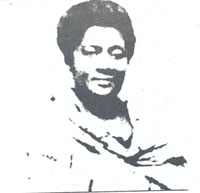 Born in Jamaica. As a child she lived seven years in Panama. Amy Ashwood Garvey helped to co-found the Universal Negro Improvement Association
(UNIA) and helped to build it into a world-wide mass Pan-African organization, with her husband Marcus Garvey. She helped to establish the ladies auxiliary wing of the movement, became the General Secretary of the UNIA in 1919 and became one of the directors of the Black Star Line shipping Company.
Born in Jamaica. As a child she lived seven years in Panama. Amy Ashwood Garvey helped to co-found the Universal Negro Improvement Association
(UNIA) and helped to build it into a world-wide mass Pan-African organization, with her husband Marcus Garvey. She helped to establish the ladies auxiliary wing of the movement, became the General Secretary of the UNIA in 1919 and became one of the directors of the Black Star Line shipping Company.
After she divorced Amy Ashwood traveled and wrote about matters concerning African and Africans. While living in London she owned a restaurant and it served as a meeting place for students and
Pan-Africanist.
She was a founding member of the International African Service Bureau (IASB) and was instrumental in organizing the 5th Pan-African Congress. Throughout her life she campaigned for the rights of African women.
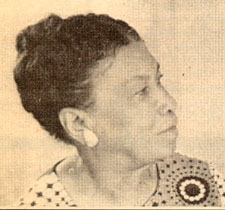 Amy
Jacques Garvey
Amy
Jacques Garvey
Amy JacquesGarvey was a pioneer Pan-African
emancipator born in Kingston, Jamaica on December 31, 1885. She became the first
lady of the Interim-Provisional Government of Africa - the Universal Negro
Improvement Association (UNIA) and African Communities League (ACL) in August
1920. She was the wife of the Right Honorable Marcus Mosiah Garvey - The
Universal African Redeemer, and mother of two sons -- Marcus Garvey, Jr. and
Julius Garvey.
Amy Jacques Garvey, like her husband, became a life-long toiler for Universal
African Liberation and advancement. She was a very special person, pursuing a
brilliant meaningful lifetime work of which every moment was dedicated to
dissemination of the philosophy and principles of her beloved husband of race
first, self-reliance and nationhood. Amy Jacques Garvey was an international
organizer and race leader in her own right. In the cause for African
Emancipation, her message was the same as her husband's -- "The hour of
Black resurrection is at hand. Black man, Black woman, be up and doing for self
and kind -- for you can achieve what you will." She was genuinely concerned
with the plight of her fellow Africans and for this reason she toiled
unceasingly from youth to old age to spread the teachings of African solidarity
and independence. Mrs. Garvey was an exemplary politician and wife. She was best
known as a publicist of Garveyism. In 1923, she edited and published Volume One
of The Philosophy and Opinions of Marcus Garvey (sub-titled Africa for the
Africans), and in 1925, she compiled and published Volume Two. During that time,
she was one of the editors of the Negro World Newspaper.
From 1919, when she became the Secretary General of the UNIA until her death, 54
years of her life was intricately bound up with the national liberation
struggles of African people. She was a relentless enemy of colonialism and
neo-colonialism. In her letters, essays, books and speeches, she always stressed
the point that the imperialist must not be allowed to creep in at the back fence
in disguise in independent African countries.
She aided and contributed financial assistance to the workers' movement in
Nigeria. She was instrumental in organizing the fifth Pan African Congress held
in 1945. Twenty-five years later, she visited West Africa at the invitation of
Kwame Nkrumah. During the 1940s she labored for the Peoples National Party of
Jamaica. She also was a sponsor of the 6th Pan African Congress which convened
in Dar Es Salaam, Tanzania in 1974. In her final years between 1968-73, she had
written and published Garvey and Garveyism (1963) and her collection of essays
on Black Power in America and The Impact of Garvey in Africa and Jamaica.
Her activities in Jamaica and the United States from 1919 to 1940 prefaced the
defeat of fascism and the irreversible disintegration of the colonial system
which led to the upsurge and triumphs of the National Liberation Movement. Amy
Jacques Garvey, who was in the forefront of this movement, wrote her seminal
"A Memorandum Correlative of Africa, West Indies and the Americas" in
1944 which was sent to the representatives of the United Nations urging them to
declare an "African Freedom Charter". She spent thousands of dollars
in purchasing and mailing many pamphlets, leaflets and newspapers to Africa, the
United States and Europe. She spent hours writing letters, articles and doing
interviews and making speeches on Black Liberation. She refused to rest or
accept payment for her work.
Amy Jacques Garvey died a fighter on July 25, 1973. Her work and memory serve
the cause for which she stood. As a Pan African Patriot, Pioneering Nationalist,
Political Scientist, Organizer, Journalist, Editor, Publisher, Philosopher,
Mother, Wife and an immortal African Giant, she will live on forever for Black
people the world over in memory of love and self-determination.
William Henry Jackson-Bey
Late President
UNIA-ACL
Woodson-Banneker-Jackson-Bey Division 330
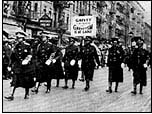
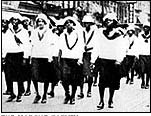
Women of the UNIA
The Universal Negro Improvement Association did not have an explicit program against sexism, it did, through groups such as the Black Cross Nurses and Universal Motor Corps, offer women a place of their own within the organization. These groups offered women a chance to develop leadership and organizational skills and a place to express their commitment to the ideals of the U.N.I.A. These women's auxiliaries and the U.N.I.A.'s Juvenile Division helped to complement U.N.I.A.
The Black Cross Nurses auxiliary was modeled on the Red Cross. Like other auxiliary divisions of the U.N.I.A., the Black Cross Nurses were organized on the local level. The first unit was established by members of the Philadelphia U.N.I.A. Henrietta Vinton Davis, one of the key national leaders of the U.N.I.A., recruited women to local Black Cross Nurse groups in the early 1920s, and local units were formed in cities in the United States, Central America, and the Caribbean. M. L. T. De Mena was another important leader and organizer in the movement. De Mena was key in organizing the UNIA in Africa and other parts of the world. Both De Mena and Davis played critical roles in the Black Star Line. Garvey once refered to Davis as "the greatest woman of the Negro race today." The Black Cross Nurses formed their own contigent in U.N.I.A. parades, making a striking appearance in long cowled white robes or green nursing uniforms. Although some members had formal medical training, most worked with practical training in first aid and nutrition. The auxiiliary performed benevolent community work and provided public health services to black neighborhoods, specializing in infant health and home care. In some localities, they worked in conjunction with established social services agencies.
The Universal African Motor Corps was a female auxiliary whose units were affiliated with local divisions and associated with the paramilitary African Legion. Members of the Corps were trained in military discipline and automobile driving and repair.
The Juvenile Divisions, the youth corps of the Garvey movement, were affiliated with local U.N.I.A. divisions and divided into classes according to age. The infant class (ages one through seven) studied the Bible, the doctrine of the U.N.I.A., and the history of Africa.
Marcus Mosiah Garvey
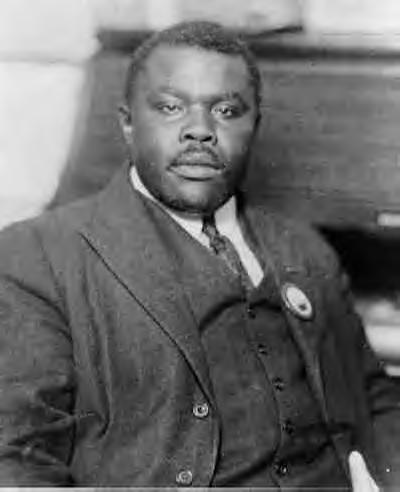
Marcus Mosiah Garvey, one of the greatest leaders African people have produced, was born August 17, 1887 in St. Ann's Bay, Jamaica, and spent his entire life in the service of his people--African people. He was bold; he was uncompromising and he was one of the most powerful orators on record. He could literally bring his audiences to a state of mass hysteria. Garvey emphasized racial pride. His goal was nothing less that the total and complete redemption and liberation of African people around the planet. His dream was the galvanization of Black people into an unrelenting steamroller that could never be defeated. I consider myself, along with many others, as one of Garvey's children.
As a young man of fourteen, Garvey left school and worked as a printer's apprentice. He participated in Jamaica's earliest nationalist organizations, traveled throughout Central America, and spent time in London, England, where he worked with the Sudanese-Egyptian nationalist Duse Mohamed Ali. In 1916 Garvey was invited by Booker T. Washington to come to the United States in the hopes of establishing an industrial training school, but arrived just after Washington died. In March 1916, shortly after landing in America, Garvey embarked upon an extended period of travel.
When he finally settled down, he organized a chapter of the
Universal Negro Improvement Association and African Communities League. The UNIA
& ACL had been formed in Jamaica in 1914.
Its motto was "One God, One Aim, One Destiny," and pledged
itself to the redemption of Africa and the uplift of Black people everywhere. It
aimed at race pride, self-reliance and economic independence.
Within a few years Garvey had become the best-known and most dynamic African leader in the Western Hemisphere and perhaps the entire world. In 1919 Mr. Garvey created an international shipping company called the Black Star Line.
By 1920 the UNIA had hundreds of divisions. It hosted elaborate international conventions and published a weekly newspaper entitled the Negro World. No other organization in modern times has had the prestige and the impact as the UNIA & ACL. During the 1920s UNIA divisions existed throughout North, South and Central America, the Caribbean, Africa, Europe and Australia.
Fortunately, Marcus Garvey's ideas and spirit lives through the millions of people he has uplifted. For example, Elijah Muhammad was a former UNIA member and while creating the "Nation of Islam", he adopted many of Garvey's ideas like race first, self-reliance, and a separate Black nation. Malcolm X (whose parents were both members of the UNIA). Ho Chi Minh of Vietnam in his youth was a seaman and once spent several months in New York regularly attending UNIA meetings. Kwame Nkrumah, the first President of Ghana, attended many UNIA meetings as a student in New York and so admired Garvey that he named Ghana's shipping company the "Black Star Line" after Garvey's line.
Pan-Africanism African Women
Students Smash fbi
Malcolm X
For More Information
[email protected]
![]()
Yahoo! Movies Exclusive ![]()


Nicole Kidman
Photo Gallery[Close] ![]()


Nicole Kidman
Photo Gallery[Close] 